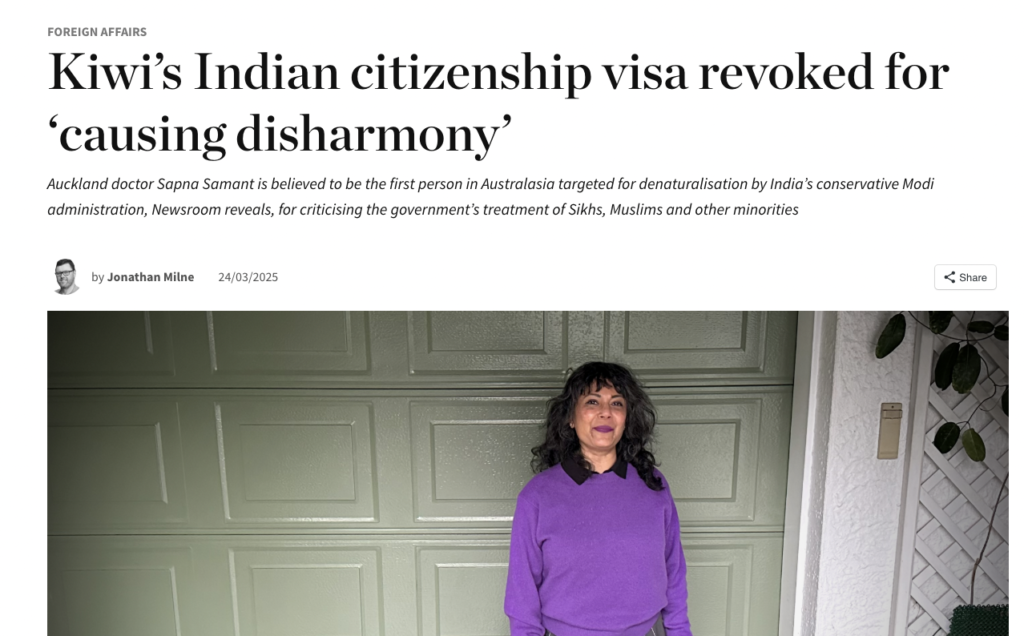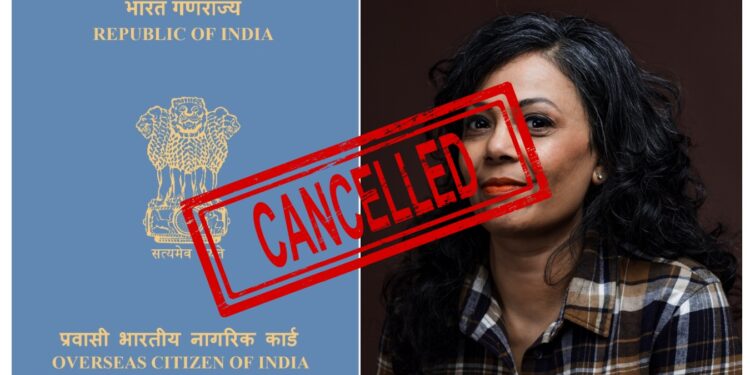The Indian government has passed a contentious immigration bill through the lower house of parliament, the Lok Sabha, despite fierce opposition calls for greater scrutiny by a joint parliamentary committee (JPC). The Immigration and Foreigners Bill, 2025, which consolidates colonial-era laws into a modernised framework, grants authorities sweeping powers to regulate foreign nationals’ entry, stay, and exit—including expanded grounds for visa cancellations and deportations.
The bill’s rushed passage comes amid growing international concern over India’s weaponisation of immigration policies against critics abroad. The recent cancellation of New Zealand-based doctor Sapna Samant’s Overseas Citizen of India (OCI) status—a move she attributes to her vocal opposition to Prime Minister Narendra Modi’s Hindu nationalist policies—has spotlighted a pattern of punitive actions targeting diaspora dissenters.
“The bill’s lack of safeguards invites abuse.” — Manish Tewari, Congress MP
Opposition Alarms Over “Arbitrary Powers”
Opposition MPs, including Congress leader Manish Tewari, have warned that the bill’s vague national security provisions risk misuse. “This legislation turns the government into a judge, jury, and executioner,” Tewari argued during the Lok Sabha debate, citing fears it could escalate the targeting of activists, journalists, and academics.
The bill replaces four outdated laws with a unified system featuring mandatory biometric registration for long-term visas, stricter penalties for violations, and a new National Immigration Authority (NIA) with broad enforcement powers. Home Minister Amit Shah defended the bill, stating India “is not a dharamshala [inn] for those who threaten its integrity.”
“This is about punishing those who dare to speak truth to power.” — Dr Sapna Samant
Diaspora Crackdown Escalates
Samant’s case mirrors over 100 OCI cancellations since 2014, many involving critics of Modi’s Bharatiya Janata Party (BJP). A third-generation doctor and Green Party candidate in New Zealand, Samant lost her OCI status in early 2025 after condemning India’s policies in Kashmir and the treatment of minorities. The Indian High Commission accused her of “causing disharmony,” pointing to her social media posts and interviews.

Similar actions have barred British academic Nitasha Kaul from entering India and revoked Swedish professor Ashok Swain’s OCI—though a court later ruled Swain’s cancellation “arbitrary.” In the US, socialist politician Kshama Sawant, denied a visa three times since 2024, alleges retaliation for her Seattle City Council resolution against India’s citizenship laws.
Global Backlash
Rights groups warn the bill institutionalises a trend of silencing dissent. “India is conflating criticism with treason,” said Elaine Pearson of Human Rights Watch. “Cancelling OCIs or denying visas to peaceful critics undermines democratic values.”
With the bill now headed to the upper house, the opposition continues to demand JPC review. Meanwhile, diaspora members like Samant face an agonising choice: silence or severance from their homeland.
Context:
The bill follows India’s rising global stature as an economic power, even as its democratic freedoms erode, per indices like Freedom House. For Australia’s 700,000-strong Indian diaspora—the fastest-growing migrant community—the implications are stark: engagement with India may now come at the cost of self-censorship.











